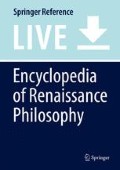Abstract
Scotism is a current or school of thought which is linked to the positions that the Franciscan John Duns Scotus taught in Paris. Unlike Thomism, Scotism was not a school in the strict sense (at least not until the sixteenth and seventeenth centuries); instead, the term was commonly used to describe philosophers who adopted Scotus’s way of doing philosophy and theology. Scotism did not play an important role in Renaissance philosophy, with one exception: the University of Padua, which continued the medieval tradition of Scotism. Nevertheless, Scotus and Scotist positions were well regarded and made use of from time to time in Renaissance philosophy.
Although Scotism, unlike Thomism, was mainly characterized by its methodological approach to philosophy and theology, some key doctrines can nevertheless be identified: above all, Scotus’s formal distinction and his theory of grades (on both of which, see below). These doctrines, in particular, have been used over many centuries to identify Scotism, Scotist positions, and Scotists. There are, however, other doctrines which also characterized Scotist thought, such as the theory of the univocity of being, the concept of haecceitas (by which something is individualized), and the form of corporeity.
References
Primary Literature
Duns Scotus, John. 1891. Quaestiones subtilissimae super libros Metaphysicorum Aristotelis. In Opera omnia, ed. Luke Wadding and John Punch, vol. VII. Paris: Apud Ludovicum Vivès.
Gorris, William. c. 1492. Scotus pauperum in quattuor libris Sententiarum. Speyer: Apud Petrum Drach.
Mathurin Le Bret. 1528/29. Parvus Scotus Lavallensis. Anger: Apud Clementem Alexandre, Petrum Arnoul, Johannem Helye.
Mastrius (de Meldola), Bartholomew, and Bonaventura Belluti. 1727. Philosophiae ad mentem Scoti cursus integer, 5 vols. Venice: Apud Nicolaum Pezzana.
Smising, Theodor. 1627. Disputationum theologicarum, 2 vols. Antwerp: Apud Guilielmum Lesteenium.
Secondary Literature
Ariew, Roger. 2000. Scotists, Scotists everywhere. Intellectual News 8: 14–21.
Bak, Felix. 1956. Scoti schola numerosior est omnibus aliis simul sumptis. Franciscan Studies 16: 144–165.
Bolliger, Daniel. 2003. Infiniti contemplatio: Grundzüge der Scotus- und Scotismusrezeption im Werk Huldrych Zwinglis. Leiden/Boston: Brill.
Cross, Richard. 1999. Duns Scotus. New York/Oxford: Oxford University Press.
Di Napoli, Giovanni. 1978. Duns Scoto nel rinascimento italiano. In Regnum Hominis et Regnum Dei. Acta Quarti Congressus Scotistici Internationalis Patavii, ... 1976, II: Sectio specialis. La tradizione scotista veneto-padovana, ed. Camille Bérubé, 265–282. Rome: Societas Internationalis Scotistica.
Duba, William O. 2012. The Souls after Vienne: Franciscan Theologians’ Views on the Plurality of Forms and the Plurality of Souls, ca. 1315–30. In Psychology and the other disciplines: a case of cross-disciplinary interaction (1250–1750), ed. Paul J. J. M. Bakker, Sander W. De Boer, and Cees Leijenhorst, 171–272. Leiden etc.: Brill.
Dumont, Stephen D. 1995. The question on individuation in Scotus’s “Quaestiones super Metaphysicam”. In Via Scoti. Methodologia ad mentem Joannis Duns Scoti. Atti del Congresso Scotistico Internazionale, Roma ... 1993, ed. Leonardo Sileo, vol. I, 193–227. Rome: PAA – Edizioni Antonianum.
Edwards, Michael. 2009. Medieval philosophy in the Late Renaissance: The Case of Internal and External Time in Scotist Metaphysics. In Renaissance Medievalisms, ed. Konrad Eisenbichler, 229–248. Toronto: Centre for Reformation and Renaissance Studies.
Gaetano, Matthew T. 2013. Renaissance Thomism at the University of Padua, 1465–1583. PhD diss., University of Pennsylvania. http://repository.upenn.edu/cgi/viewcontent.cgi?article=2023&context=edissertations
Hoenen, Maarten J.F.M. 1997. Thomismus, Skotismus und Albertismus. Das Entstehen und die Bedeutung von philosophischen Schulen im späten Mittelalter. Bochumer Philosophisches Jahrbuch für Antike und Mittelalter 2: 81–103.
Hoenen, Maarten J.F.M. 1998. Scotus and the Scotist School. The tradition of Scotist thought in the medieval and early modern period. In John Duns Scotus (1265/6 – 1308). Renewal of Philosophy. Acts of the Third Symposium Organized by the Dutch Society for Medieval Philosophy Medium Aevum, ed. Egbert P. Bos, 197–210. Amsterdam/Atlanta: Rodopi.
Knebel, Sven K. 1995. Skotismus. In Historisches Wörterbuch der Philosophie, ed. Joachim Ritter and Karlfried Gründer, vol. IX, 988–991. Basel: Schwabe.
Mahoney, Edward P. 1978. Duns Scotus and the school of Padua around 1500. In Regnum Hominis et Regnum Dei. Acta Quarti Congressus Scotistici Internationalis Patavii, ... 1976, II: Sectio specialis. La tradizione scotista veneto-padovana, ed. Camille Bérubé, 215–227. Rome: Societas Internationalis Scotistica.
Monfasani, John. 1993. Aristotelians, Platonists, and the Missing Ockhamists: Philosophical Liberty in PreReformation Italy. Renaissance Quarterly 46: 247–276.
Pini, Giorgio. 2010. Scotus’s legacy. In 1308: Eine Topographie historischer Gleichzeitigkeit, ed. Andreas Speer and David Wirmer, 486–515. Berlin/New York: De Gruyter.
Roest, Bert. 2000. A history of Franciscan education (c. 1210–1517). Leiden/Boston/Cologne: Brill.
Roßmann, Heribert. 1989. Franziskanerschule. In Lexikon des Mittelalters, vol. IV, 824–830. Munich/Zurich: Artemis.
Schmitt, Charles B. 1978. Filippo Fabriʼs philosophia naturalis Io. Duns Scoti and its relation to Paduan Aristotelianism. In Regnum Hominis et Regnum Dei. Acta Quarti Congressus Scotistici Internationalis Patavii, ... 1976, II: Sectio specialis. La tradizione scotista veneto-padovana, ed. Camille Bérubé, 305–312. Rome: Societas Internationalis Scotistica.
Schmutz, Jacob. 2002. L’héritage des subtils: cartographie du Scotisme de l’âge classique. Les études philosophiques 60: 51–81.
Schmutz, Jacob. 2016. Was duns scotus a voluntarist? Juan caramuel lobkowitz against the bratislava franciscans. Filosofický Časopis Special Issue: 147–184.
Williams, Thomas. 2016. John Duns Scotus. The Stanford Encyclopedia of Philosophy (Spring 2016 Edition), ed. Edward N. Zalta. http://plato.stanford.edu/archives/spr2016/entries/duns-scotus/. Accessed 5 July 2016.
Zahnd, Ueli. 2014. Wirksame Zeichen? Sakramentenlehre und Semiotik in der Scholastik des ausgehenden Mittelalters. Tübingen: Mohr Siebeck.
Author information
Authors and Affiliations
Corresponding author
Editor information
Editors and Affiliations
Section Editor information
Rights and permissions
Copyright information
© 2017 Springer International Publishing AG
About this entry
Cite this entry
Jeschke, T. (2017). Scotism. In: Sgarbi, M. (eds) Encyclopedia of Renaissance Philosophy. Springer, Cham. https://doi.org/10.1007/978-3-319-02848-4_684-1
Download citation
DOI: https://doi.org/10.1007/978-3-319-02848-4_684-1
Received:
Accepted:
Published:
Publisher Name: Springer, Cham
Print ISBN: 978-3-319-02848-4
Online ISBN: 978-3-319-02848-4
eBook Packages: Springer Reference Religion and PhilosophyReference Module Humanities and Social SciencesReference Module Humanities

